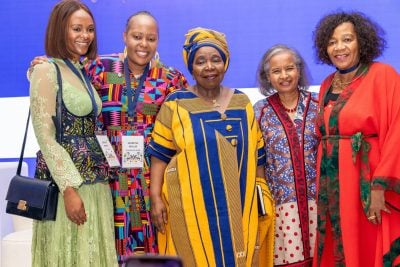KY Amoako’s book provides an insider’s view of the institutions and decisions that have shaped African development since independence. Review by Stephen Williams
Know the Beginning Well: An Inside Journey through Five Decades of African Development is both the life story of KY Amoako, president of the African Center for Economic Transformation (ACET) in Accra, and a riveting account of the various development challenges that Africa has faced over the last 50 years.
Amoako played a significant role in this regard. He was one of the earliest African technocrats to join the World Bank – at the time, an institution dominated by the US and the European powers.
“In the 1970s, I joined the World Bank, which effectively held the future of Africa in it hands yet employed very few Africans,” Amoako recalls. “Over two decades, I climbed through the ranks, finding myself in the middle of many of the most highly-charged issues, policies, and personalities that defined the Bank during Africa’s most turbulent years.”
His two decades at the World Bank began after he was accepted as a Young Professional, a kind of one-year trial apprenticeship scheme.
After gaining a full post, he moved to Washington DC in the middle of July 1974, where his time was punctured by confrontations with the existing order, which he says undervalued African input. There were very few Africans working at the Bank and consequently little knowledge of the continent, while racist attitudes were not uncommon.
Amoako also had health issues to contend with that almost stymied his ambition to return to Africa. After falling ill with flu-like symptoms, he was diagnosed with hypereosinophilia, a rare blood disorder that can damage vital organs.
He came under the care of a team of doctors under the leadership of Anthony Fauci – the same physician who has led the US administration’s response to the Covid-19 virus and provided a refreshing contrast to President Trump’s more outlandish responses to the disease.
“I believe Dr. Fauci saved my life,” Amoako says.
“The heart episode was a wake-up call. I knew I could no longer push myself to such an extreme. I also knew I wanted to spend more time with my wife, Philomena and my daughters, who were old enough now to be aware of their surroundings. And for that reason, working in Africa became even more important to me. I was finally able to make that happen.”
Implementing reform in Zambia
Amoako was posted by the Bank to Zambia in 1981. In the early 1980s, Zambia’s per capita GNP in real terms was one-third less than in 1964. The rate of inflation had moved from around 15% at the end of the 1970s to a peak of almost 50% a few years later. Foreign debt had begun to mount, as had arrears in previous loan payments to the Bank and IMF. Zambia’s average annual growth rate from 1973 until 1980 in mining, its overwhelmingly dominant economic sector, was -0.3%.
“Since gaining independence, Zambia had regressed economically in almost every way,” Amoako comments. “The more I got to know about Zambia’s political economy, the more I realised how deeply it contributed to the country’s economic problems.”
Zambia’s President Kenneth Kaunda was the first African president that Amoako was to meet.
“That first meeting took place in Kaunda’s personal study. He and I were alone, with no aides or advisors. Kaunda struck me as gracious, charming – and savvy. For the first 10 minutes at least, he only talked about his love for Ghana and Kwame Nkrumah.”
Amoako was to find a pan-African solidarity with his hosts: “Contrary to the racial perceptions that prevailed in Washington, the Zambian officials quickly considered me to be one of their own.
“They welcomed me, my ideas, and, most important, my family. I found the Zambians to be warm and friendly. And most of them – though certainly not all – were as eager as I was to turn things around.”
He created a special economic management team to bring together the key policymakers to hash out their decisions and collectively make recommendations.
“We hoped such a mechanism would break past patterns, wherein hardliners would go directly to Kaunda to try and undermine reform momentum. To our relief, KK endorsed the idea. So we formed the team and named it the ‘Special Economic Unit’ – and it brought policy coordination to the top levels of Zambian government for the first time.”
Amoako admits that within two years the entire reform programme had collapsed – as in many of the continent’s countries during this period, progress was rarely straightforward or maintained for long.
Amoako left Lusaka in July 1985, returning to World Bank headquarters in Washington, DC, to start a new job, one that allowed him to keep working on African policy but apply the successes and failures from Zambia.
Those lessons appear to have had a lasting effect on how Amoako continued to work with African governments. Two years later, he was posted to Kenya and Uganda before his remit was broadened to take charge of the Bank’s programmes in Ethiopia, Mauritius, Somalia, and Sudan.
“For better or worse, there was no more dominant player in African development during the 1980s than the World Bank,” Amoako writes.
“Prior to 1987, two wholly separate vice presidencies were responsible for Sub-Saharan Africa: the Western Africa region and the Eastern and Southern Africa region. This division made it difficult to apply a coherent strategy to common issues facing the continent.”
As a World Bank insider, Amoako perhaps underestimates the serious damage that structural adjustment programmes (SAPs) did to the Bretton Woods institutions’ reputation across the continent, merely dismissing them as “controversial”.
SAPs may have been well intentioned, designed to reform African economies with loan conditions to strengthen government institutions, capacities, and policies in order to make aid more effective. However, for many Africans faced with rising unemployment and the withdrawal of subsidies, SAPs proved deeply unpopular and eroded support for the work of the World Bank and the IMF.
At the helm of UNECA
After a stint in Brazil, in 1995 Amoako took the helm at the UN’s Economic Commission for Africa (UNECA), based in Addis Ababa. He was to put in place reforms that his successors were to build on to make UNECA the vibrant institution it is today.
“We were at the centre of dramatic socioeconomic changes in policy and approach at the turn of the century, working with African leaders to completely redefine the aid dynamic between African countries and donors.
“Through it all, I worked alongside a new generation of African leaders who were integral in changing the African narrative.”
And that work continued after his two five-year terms ended and he returned home to Ghana where he founded the African Center for Economic Transformation (ACET) to help governments and leaders ensure that the momentum of the new millennium was not lost.
Know the Beginning Well: An Inside Journey through Five Decades of African Development, by KY Amoako; $39.95; Africa World Press; ISBN: 9781569026304
Want to continue reading? Subscribe today.
You've read all your free articles for this month! Subscribe now to enjoy full access to our content.
Digital Monthly
£8.00 / month
Receive full unlimited access to our articles, opinions, podcasts and more.
Digital Yearly
£70.00 / year
Our best value offer - save £26 and gain access to all of our digital content for an entire year!
 Sign in with Google
Sign in with Google 


